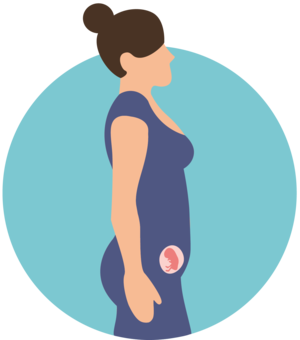Pregnancy at week 11
4-minute read
Your baby
Your baby now measures about 4.5 cm — about the size of a fig - and weighs around 10g. The brain and nervous system have almost finished developing. The muscles and nerves are now starting to work together so the baby is starting to make small, jerky movements around your uterus.
The baby’s head is now about the same length as their body. The bones are starting to harden, the baby’s hands and feet are in front of their body, and they have individual fingers and toes with nail beds. The passages of the nose are open and the tongue has formed.
The fingernails are growing, the heart is pumping blood, and there are teeth inside the gums.
Your baby at 11 weeks
| Length: | 4.5cm |
| Weight: | 10g |

Your body
Many women find morning sickness starts to settle down by week 11, although some don’t feel better until about week 14, when the pregnancy hormones decrease and the placenta starts to support the baby.
You might get cramps in your legs or feet. One way of dealing with this is to eat more calcium in foods such as milk, yoghurt and cheese. Make sure you’re getting enough exercise, too – about 30 minutes of moderate exercise per day is ideal.
Things to remember
From week 11 of your pregnancy, you can have an ultrasound scan to check how the baby is developing. This is often when you see an image of your baby for the first time. An ultrasound can be used to check your due date and also whether your baby is at risk of a condition such as Down syndrome.
You might also think about prenatal screening now to check for Down syndrome and other genetic abnormalities. You do not have to do this; it depends on your age, history and own personal circumstances. Now is a good time to talk to your doctor or a genetic counsellor about whether screening is right for you.
The reasons you might decide to talk to a genetic counsellor include if:
- there are genetic conditions in your family or the father’s family
- you or your partner has a serious condition that could be passed on to the baby
- you both carry a faulty gene
- you are older than 35
- you have been exposed to harmful chemicals or household products during your pregnancy
- you have had an ultrasound or another screening test that showed your baby could be at increased risk
- you and your partner come from an ethnic backgrounds where genetic problems are more common
Read next

Your pregnancy at 12 weeks
Learn about your pregnancy journey and what is happening to you and your baby.

Speak to a maternal child health nurse
Call Pregnancy, Birth and Baby to speak to a maternal child health nurse on 1800 882 436 or video call. Available 7am to midnight (AET), 7 days a week.
Learn more here about the development and quality assurance of healthdirect content.
Last reviewed: August 2020



